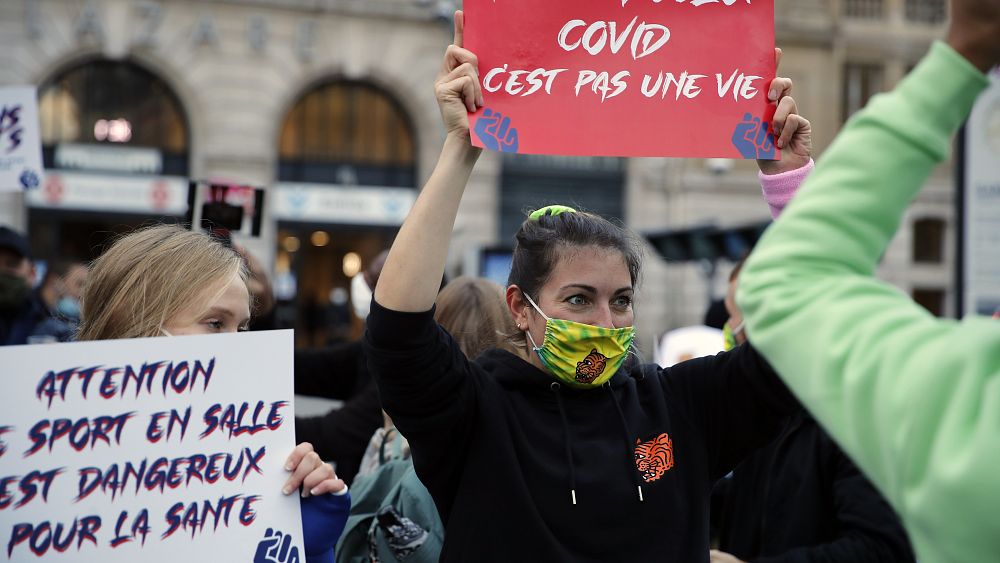
COVID-19 has created some potentially long-lasting geographical and generational divides across the European Union with people in southern and eastern countries more likely to report personal or financial distress due to the pandemic, a new survey has found.
The survey, released on Wednesday by the European Council on Foreign Relations (ECFR), finds that Europeans feel generally less free than they did two years ago and warns that this could have big implications for politics across the Old Continent.
Overall, a majority — 54% — of the 16,200 people polled by the Brussels-based thinktank across 12 EU member states say they have not been affected “at all” by COVID-19. But the picture at the country level reveals what the authors have described as a “tale of two pandemics.”
More than half of respondents in the six northern and western countries surveyed — Denmark, Germany, France, Netherlands, Sweden, and Austria — said they were not impacted at all by the pandemic.
However, in the six southern or eastern countries — Bulgaria, Hungary, Italy, Poland, Portugal, and Spain — the percentage saying so slipped below 50%, with the majority of respondents reporting having either been impacted by the illness or financially.
Two other divides were also identified by the survey.
Generation divide
The first one is a generational split, with almost two-thirds of respondents over the age of 60 affirming that they have experienced no personal repercussions from COVID-19 whereas only 43% among those under the age of 30 said the same.
Age also has an impact on how people feel about who is to blame for the spread of the pandemic. A slim majority (51%) of those over the age of 60 put the blame on individuals, while younger Europeans under 30 are more likely to blame governments and other institutions (49%) over individuals (42%).
“In some ways, this is not surprising. It is true that our ageing societies arrange many policies – on tax and public spending, on the environment, on planning laws – around the interests of the older citizens who vote rather than the younger ones who will inherit the earth,” the report notes.
“However, the division of the costs of COVID-19 is, in some ways, even starker and more immediate. There is a widespread sense in many societies that the futures of the young have been sacrificed for the sake of their parents and their grandparents.
“This sentiment echoes that felt by earlier generations of young people who went through other seismic changes such as world wars and revolutions. It seems hard to think that we will not see consequences as the divide becomes more obvious,” it adds.
Freedom divide
The third big divide revealed by the study concerns the idea of freedom.
Only 22% of those surveyed said they felt free, down from 64% before the pandemic. The percentage of people who say they do not feel free has meanwhile jumped to 27% from 7% two years ago.
Just one in ten German now say they feel free when they were 68% saying so in 2019. This is despite Germany having eschewed the more strict lockdowns seen in other countries like France, Italy and Spain.
But the loss of freedom is particularly keenly felt in Austria and Netherlands where the share of people feeling free has dropped more than 60 percentage points over the past two years to settle at 15% and 19% respectively.
Meanwhile, the biggest share of people who currently feel free can be found in Hungary (41%) and Spain (38%). However, only 48% of Spaniards felt free two years ago when 68% did so in Hungary.
This particular metric matters, the report states, “because the crisis appears to have led to a big shift in the way that political parties relate to freedom: many mainstream parties have been busily re-embracing government action, while many populist parties are becoming more libertarian.”
How COVID is reshaping European politics
ECFR says the way the different perceptions of freedom are influencing politics can be particularly observed in Poland, France and Germany.
In Poland, it says, the pandemic has reinforced divisions between pre-existing ideological groups. “Because most of the population is very distrustful of the government, they attribute nefarious motives to COVID-19 restrictions and see government action as a big threat to freedom,” it highlights.
Poland has the highest share of people who think that the government is using pandemic-related restrictions to create the illusion of control or as an excuse to control the public.
“As a consequence, most Poles think that the biggest threat to their freedom comes from the top – they blame their government and other major institutions for the pandemic’s impact on their lives,” it adds.
In Germany, long ruled by “consensus democracy” helmed by various coalition governments, there has been no strong public opposition to the restrictions or mistrust about the motivations to implement them.
But the strong shift in people reporting feeling free “hides very high levels of discontent,” the ECFR flags.
Across the border, the pandemic has prompted “striking changes of political philosophy” in some of the most important French parties. Supporters of President Emmanuel Macron’s centrist, liberal La Republique en Marche party, for instance, are now more likely to support highly interventionist state action. But many supporters of Marine Le Pen, the leader of the far-right Le Rassemblement National which has often called for a stronger state, now “want their party to pose as a tribune of freedom against the repressive power of the pandemic state.”
Mark Leonard, ECFR founding director and one of the co-author of the survey, warned in a statement that the “stark divides” that have cropped up because of COVID-19 “could be as serious as those during the euro and refugee crises.”
“This makes for a fragile climate in many parts of Europe, and, for national governments and the EU, could present an issue, as they seek to restore personal freedoms and roll-out their COVID recovery packages,” he said.